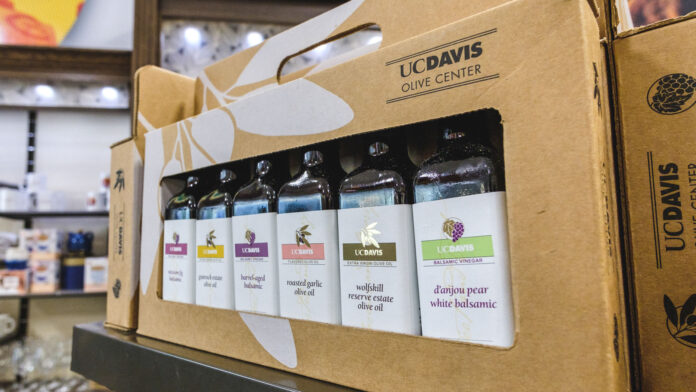Under Assembly Bill 2074, olive oil labeled “Californian” must primarily be derived from Californian olives
A new set of standards for California olive oil will separate natively-cultivated olive oils from mislabeled, imported ones. These standards are the result of a bill proposed by Assemblywoman Cecilia Aguiar-Curry on Feb. 5.
Assembly Bill 2074 will tighten restrictions on whether olive oil companies can put the word “California” on their bottles, specifically requiring that bottles labeled “Californian” contain 100% California olives. These new restrictions include imprisonment, fines, or both if the requirements are not met.
“This bill would make it unlawful and subject to imprisonment, fine, or both, as specified, to make any false representation in a brand name, label, advertising matter, packaging material, letterhead, invoice, tag, sign, business card, or other oral, written, or printed matter that an olive oil is produced entirely from olives grown within California, including using the terms ‘California olive oil,’ ‘California olives,’ or substantially similar representations,” AB 2074 read.
Furthermore, this bill applies to regional claims as well — if a particular region is included on a label, then that exact percentage of olives should come from that region.
“This bill would apply a similar prohibition on representations that an olive oil was produced from olives from a specific region of California unless at least 85% of the olive oil, by weight, was produced from olives grown in that specific region,” AB 2074 read.
This restriction ensures that the rights of consumers and producers alike are protected. It also makes sure that local producers do not face false competition when entering the market, and that consumers do not buy misrepresented products.
A report published in 2011 of a study conducted by the UC Davis Olive Center initially found the quality of olive oil sold in Californian stores were inconsistent.
“While there are many excellent imported and domestic extra virgin olive oils available in California, our findings indicate that the quality level of the largest imported brand names is inconsistent at best, and that most of the top-selling olive oil brands we examined regularly failed to meet international standards for extra virgin olive oil,” the report read.
Yet, while this report is regularly cited, Judge Christopher Cooper noted that the consistency of olive oil can further change from year to year, according to Olive Oil Times.
For more precaution, Karen Bond, one of the co-founders of Bondolio Olive Oil, explained the commercialization of foreign oils.
“If foreign oils are being purchased, they are usually being shipped by boat,” Bond said. “Olive oils need to be kept between 55 and 65 degrees in order to stay fresh, and if it goes in a boat — how do we know that it is being temperature controlled?”
Most consumers are unaware of olive oil’s bioactive nature, according to a 2013 study published in Food Research International. Bioactive substances include vitamins, enzymes and antibiotics that break down over time.
Oils from the Bondolio Olive Oil Farm, located in Winters, Calif., have won “Best In Show” at the California State Fair’s Extra Virgin Olive Oil competition numerous times.
“California has the highest standard in the world for certified extra virgin olive oil (EVOO),” Bond said. “Because of the California Olive Oil Council […], our standard is the highest in the world, even better than the International Olive Council (IOC).”
Bond added that the extra precaution for labeling olive oils would be beneficial for consumers outside of California.
“I think [that] the new law is fabulous,” Bond said. “People from the east coast and other places — who aren’t as familiar with California olive oil — probably are confused about labeling.”
Although this measure will clearly separate imported oils from those locally produced, individuals looking for the highest quality of California olive oil should always look for the California Olive Oil Council (COOC) seal, according to its website.
“We tell people that if it is certified by COOC […] it has been tested chemically to meet their standards,” Bond said. “It also has to go through a sensory evaluation to test for defects. One defect, and it cannot be labeled as extra-virgin.”
AB 2074 does not place new restrictions on the production of olive oil. It establishes firm guidelines for the marketing and labeling of Californian olive oils. This bill aims to strengthen the integrity of olive oil labels and build consumer confidence.
“I think it’s good for the state,” Bond said. “If it’s going to say California, it should be 100% Californian.”
Written by: Rachel Heleva — city@theaggie.org
Editor’s Note: An earlier version of this article stated that California produces 4% of the world’s olive oil. That is incorrect, as the overall U.S. production of olive oil is much less. The article has since been updated to further clarify the language of AB 2074 as well as take out misinformation about how much olive oil California produces. The Aggie regrets the error.








